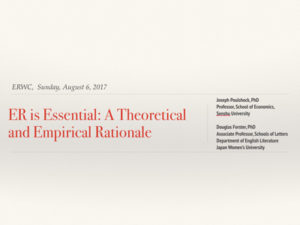 By Joseph Poulshock & Douglas Forster
By Joseph Poulshock & Douglas Forster
45 Minute Paper, Presented at the Extensive Reading World Congress
Sunday, August 6, 2017
Is ER essential? The presenters consider this claim by looking at various theories en masse, which are corroborated by research, that guide and support ER. Thus, the presenters show that by integrating these theories and their related research that we can have increased confidence that ER is indeed essential.
Experts say that ER is essential, but this claim needs to be supported. We can do so by considering en masse various theories, which are corroborated by research, that guide and support ER.
Thus, in this paper we look at language acquisition and general learning theories that mesh directly or indirectly with ER. These theories include the Communication Hypothesis, the Comprehension Hypothesis, the Spaced Repetition Hypothesis, the Retrieval Hypothesis, the Interleaving Hypothesis, the Generation Hypothesis, the Noticing Hypothesis, the Flow Hypothesis, and the Task-Based Learning Hypothesis.
After seeing the varying degrees that these theories harmonize with ER, we consider their empirical support. In addition, we also examine some of their weaknesses in relation to ER.
For example, extensive readers may acquire language through the receptive spaced retrieval of grammatical and lexical items. This is because readers abundantly meet the same high frequency grammatical and lexical items through ER. However, readers may not as effectively remember the factual or narrative content in texts by reading and rereading because this content is only repeated as many times as a reader reads a particular text. Rather readers may better remember textual content by active retrieval and spaced repetition, such as through spaced self-quizzing of the factual or narrative content in texts.
In short, despite some weaknesses, when we consider en masse the theories that underpin ER, and when we see the related lines of research that support it, we can have increased confidence that ER is truly an essential component of language education.
